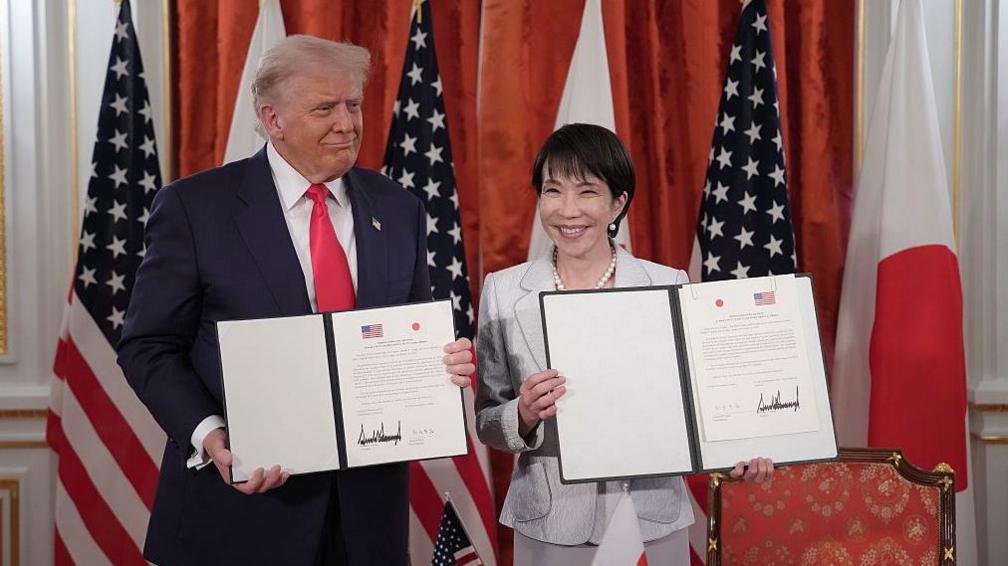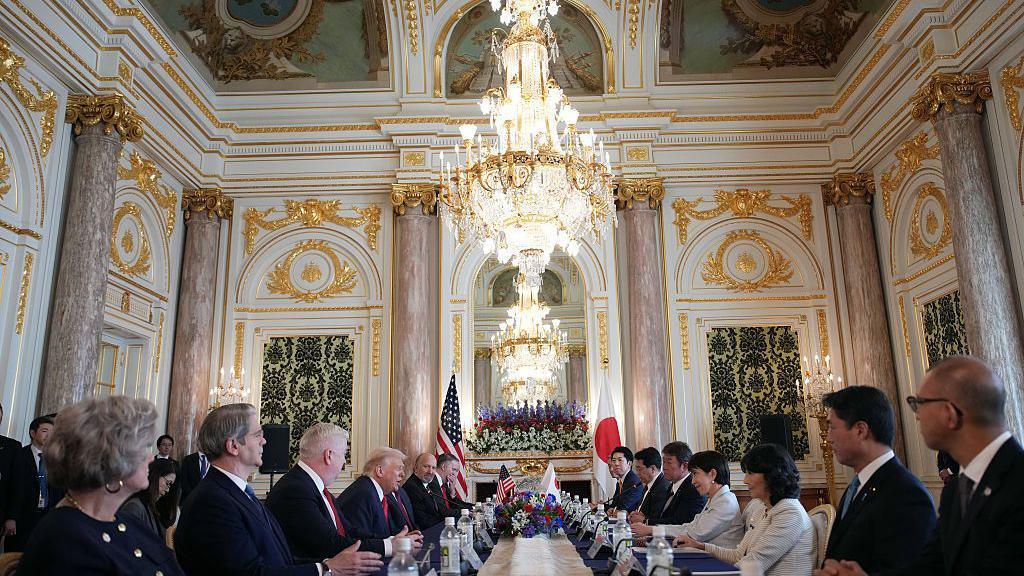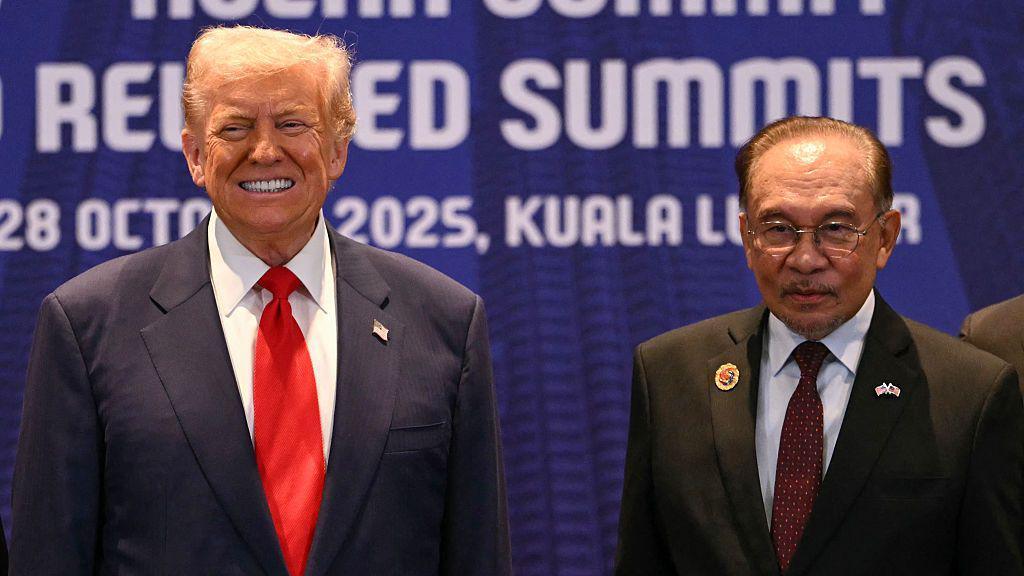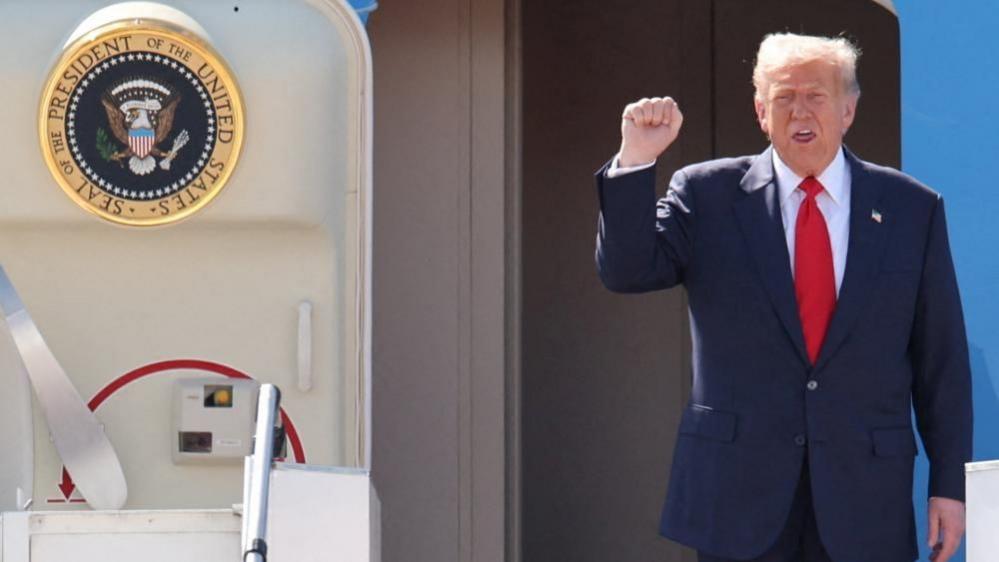Rare earths, Nobel nomination and cheers: Trump ends Japan leg of Asia tour
Watch: Trump addresses cheering troops on US carrier in Japan
- Published
Praise, Nobel nominations and promises of foreign investment in the US - Japan's newly-elected Prime Minister Sanae Takaichi rolled out the red carpet for Donald Trump on Tuesday.
Trump in turn had warm praise for Takaichi, telling her that the US would be there for "anything you want, any favours you need, anything… to help Japan".
The two leaders signed a deal on rare earth minerals, as well as a document heralding a new "golden age" of US-Japan relations which reiterated the commitment of the two countries to implement deals struck earlier, including the 15% tariff deal negotiated earlier this year.
The pageantry and the venue also seemed tailor-made for the US president.
A full military guard of honour and band welcomed Trump to the ornate Akasaka Palace, with its vaulted ceilings and gold-encrusted walls not unlike what the president wants in his planned White House ballroom.
Over lunch, Trump congratulated Takaichi for becoming Japan's first female prime minister.
Notably, according to a White House readout, that lunch was "American rice and American beef, deliciously made with Japanese ingredients" - a move that will no doubt have delighted Trump, who has long demanded that Japan buy rice from the US.
Takaichi also accompanied Trump aboard a US aircraft carrier, the USS George Washington, where they were greeted by thousands of cheering American troops. Takaichi took the stage and praised what she called the "greatest alliance in the world" and pledged to increase defence spending.
Trump has in the past criticised Japan's lack of defence spending. In April this year, he lambasted a security treaty with Japan as being "one-sided", saying: "We pay billions of dollars to defend them, but they don't pay anything."
Ahead of their meeting on Wednesday, Trump said he was sure that he would have a "fantastic relationship" with Takaichi, who had a strong connection with former PM Shinzo Abe, a Trump favourite who was shot dead in 2022.
"She was a great ally and friend of Abe, who was my friend… He was one of the best… I know they were very close, and I think philosophically they were close, which is very good," he told reporters while flying over to Japan from Malaysia on Tuesday.
Trump is spending a week in Asia. He will leave Japan for South Korea on Wednesday, and is expected to meet Chinese leader Xi Jinping there on Thursday.

Donald Trump met Sanae Takaichi, Japan's new prime minister, on the visit
The meeting with Trump was seen as a critical early test for Takaichi, who was elected as prime minister by Japanese lawmakers earlier this month.
Both countries have long been allies, but navigating a relationship with a fickle Trump, who has in the past appeared to waver in his commitment to Japan, lies at the core of the country's foreign policy.
On Wednesday, Takaichi described Trump as a "partner in a new golden era", and praised his role in bringing peace to the Middle East. She announced that Japan would be nominating him for the Nobel peace prize.
She also presented Trump with a collection of golf-related gifts, according to Trump's assistant Margo Martin.
These included a golf bag signed by Hideki Matsuyama, the first male Japanese golfer to win a major golf championship, as well as a putter used by Abe. They also signed two caps printed with the words: Japan is back.
In turn, Trump described her as a "close friend" and described the US alliance with Japan as a "beautiful friendship" that was "born out of the ashes of a terrible war". He also announced he had approved the first delivery of long-awaited US missiles for F-35 fighter jets to Japan, which would take place this week.
Pleasantries have set a positive tone to the meetings so far, but behind the smiles and the pagentary, there is real pressure on Japan.
During the working lunch, Takaichi presented Trump with a map showing the investments that Japanese companies have made in the US. And during his speech on the USS George Washington, Trump said Takaichi had told him earlier about plans for Toyota to put $10bn (£7.5bn) into building plants "all over" the US.
But Trump also wants more access to Japan's markets - not just getting them to buy more rice, but also soybeans, and to open its market to US vehicles.

The US president was hosted in the ornate Akasaka Palace
But Takaichi also needs to protect domestic industries and doesn't want to anger crucial interest groups at home, like the powerful farming lobby.
Tokyo is heavily reliant on exports, and cannot afford a tariff fight especially when it comes to its auto industry. Automakers - the country's largest exporters to the US - faced 24% tariffs and tens of billions of dollars in losses.
Tariffs have now been lowered to 15%, in step with rivals in the region such as South Korea.
Tomohiko Taniguchi - former special adviser to Abe - said there were things that Takaichi could draw on from Trump's relationship with her late mentor. He said it was important for Takaichi to be "straightforward and say bluntly what Japan's national interests are, and to see where those two nations national interests overlap, and always mindful that Japan's safety must be in hands of the Japanese".
But Takaichi won't just have to balance Japan's interests and its alliance with the US – she'll also have to do that while maintaining the country's crucial trade partnership with China.
Rintaro Nishimura senior associate at the Asia Group said: "Takaichi will have to walk a very fine line, maybe tone down some of her more hawkish tendencies on China... but also assure Trump that the US-Japan relationship is the most important."
Related topics
- Published27 October

- Published26 October
